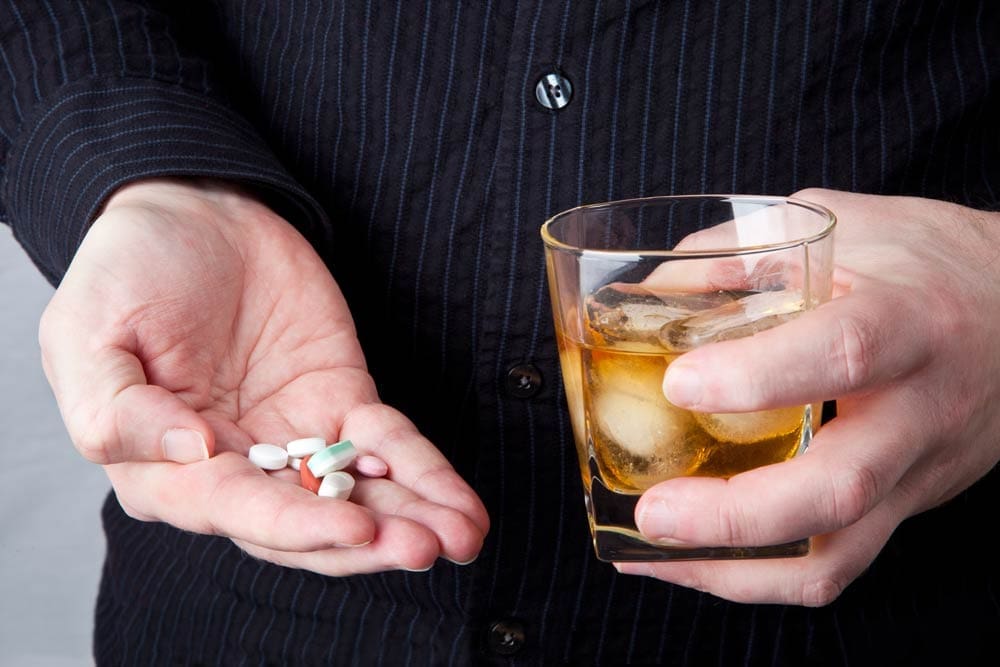Table of Contents
Mixing Benzos and Alcohol
Those who mix prescription benzodiazepines and alcohol often do so in hopes of increasing the effects of both chemical substances, which can have dangerous results.
Mixing benzos and alcohol is dangerous and ends in death every day. Whether a person mixes these powerful drugs with alcohol to boost their intoxicating effects or accidentally combines them, the interaction between these two depressants is always toxic. Additionally, it can easily lead to death by overdose.
What Are Benzos?
Benzodiazepines, also called benzos, are sedatives used to treat moderate to severe anxiety-related disorders. They are effective for the short-term treatment of anxiety disorders, but using them for more than 4 weeks consecutively carries a high risk of abuse and addiction.
Benzos work by increasing the effects of a chemical in the brain called gamma-aminobutyric acid (GABA). GABA slows the activity and reactiveness of nerves in the brain, promoting a sense of relaxation and calmness. This effect makes benzodiazepines useful in relieving the high degree of distress found in both acute and chronic anxiety disorders. They’re also given for sleep problems, seizures, and muscle relaxation. Benzos vary by how fast they take effect and how long those effects last, which makes them suitable for different purposes.
Benzos can also prompt euphoria, which can intensify when combined with other drugs, such as alcohol or opioids.
Commonly given benzodiazepines include:
- Xanax (alprazolam
- Valium (diazepam)
- Ativan (lorazepam)
- Klonopin (clonazepam)
- Restoril (temazepam)
Combining Benzos and Alcohol
Benzodiazepines and alcohol are frequently abused in the U.S. Over 17 million American adults abuse benzodiazepines. According to the 2018 National Survey on Drug Use and Health, 14.4 million Americans struggle with an alcohol use disorder. Many of these millions abuse both benzos and alcohol simultaneously.
Alcohol and benzos affect the same nerve cells and systems in the brain, and they do so similarly. Both benzos and alcohol slow down nerves within the brain. Unfortunately, many of these nerves are also part of the vital processes that keep us alive and regulate our breathing, heart rate, and body temperature. Other areas of the brain that are slowed by alcohol and benzos include those nerve bodies responsible for our ability to learn, form memories, think, and feel.
Additionally, benzodiazepines and alcohol are digested, metabolized, and excreted by the same systems in the body. This means that when taken together, benzos and alcohol slow down the rate at which they’re processed out of the body. Consequently, this leads to a toxic buildup of both substances in the bloodstream, magnifying the most harmful effects of benzos and alcohol.
Some of the typical results of mixing benzos and alcohol include:
- Memory problems
- Blackouts
- Dizziness
- Impaired coordination, total loss of coordination
- Mood swings
- Irritability
- Depression
- Nausea
- Vomiting
- Loss of bowel or bladder control
- Unconsciousness
- Organ failure
- Coma
- Death
The greatest risk of mixing benzos and alcohol is a greatly slowed breathing reflex, which causes less and less oxygen to get to a person’s brain, leading to brain damage or death from a lack of oxygen (hypoxia).
Absolute Awakenings and Polysubstance Abuse
When people abuse two or more substances together, it’s called polysubstance abuse. Absolute Awakenings is dedicated to treating those who have struggled with alcohol abuse and the abuse of prescription sedatives such as benzodiazepines. If you or someone you love is struggling with an addiction to substances, alcoholism, or both, our specialists are available around the clock to assist you.
Absolute Awakenings follows an evidence-based approach to treating alcohol and substance abuse disorders. We are committed to providing long-term recovery for those struggling with addiction. Recovery is not a one-size-fits-all approach, so every person that walks through our doors is provided with unique and individualized care. Call us today. Our recovery specialists are waiting to assist you or a loved one in your fight against addiction.
References
- Longo LP, Johnson B. Addiction: Part I. Benzodiazepines—Side Effects, Abuse Risk and Alternatives. afp. 2000;61(7):2121-2128.
- GABA Neurotransmitter :: CSHL DNA Learning Center. Accessed January 20, 2023. https://dnalc.cshl.edu/view/485-GABA-Neurotransmitter.html#:~:text=GABA%20occurs%20in%2030%2D40,likely%20to%20excite%20nearby%20neurons.
- 2018 National Survey of Drug Use and Health (NSDUH) Releases. Accessed January 20, 2023. https://www.samhsa.gov/data/release/2018-national-survey-drug-use-and-health-nsduh-releases
- Understanding Alcohol Use Disorder | National Institute on Alcohol Abuse and Alcoholism (NIAAA). Accessed January 20, 2023. https://www.niaaa.nih.gov/publications/brochures-and-fact-sheets/understanding-alcohol-use-disorder
- Maust DT, Lin LA, Blow FC. Benzodiazepine Use and Misuse Among Adults in the United States. Psychiatr Serv. 2019;70(2):97-106. doi:10.1176/appi.ps.201800321
Absolute Awakenings Treatment Center Editoral Guideline
At Absolute Awakenings, we take information integrity seriously. We have dedicated our resources to ensure that all content published to our blog is medically sound. As such, all content on our blog has been thoroughly reviewed by a doctorate level clinician such as a Medical Doctor, or Psy.D, so that you can trust all of the data we publish.







